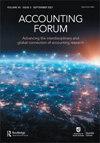On the use of framing strategies by the Big Four accounting firms: bringing sustainability risks into the mainstream
IF 3.4
4区 管理学
Q2 BUSINESS, FINANCE
引用次数: 2
Abstract
ABSTRACT This paper analyses the discourse that the Big Four accounting firms have promoted on the notion of sustainability risks, ultimately framing them as economical, technical, tractable and controllable. Drawing on Douglas and Wildavsky’s (1982) anthropological understanding regarding the construction of risk in modern society in combination with frame theory, we study how the Big Four's specialized publications frame sustainability risks and the magnitude of their consequences. Our analysis indicates that four framing strategies characterize the firms’ discourse: representing the Big Four as proactive knowledge producers; promoting quantification and measurability; fostering neoliberal policy-making and de-emotionalizing socio-environmental issues. We maintain that through these framing strategies, the wicked issues of sustainability are overly simplified, transposed into the conventional area of organizational economics, and therefore made manageable in the unbroken pursuit of corporate growth. In other words, the apparent aim is to take sustainability risks into a territory where corporate elites are in the habit of thinking and acting: the economic arena, as delimited by the boundaries of the organization. In so doing, the Big Four create a space for their role as business advisors, ensuring that their profitability is strengthened as companies seek professional help in establishing a meaningful control structure around (narrowly defined) sustainability risks. Instead of bringing sustainability risks into the purview of organizational controllability, we believe there is a crucial need to bring business organizations and the Big Four accounting firms into the purview of responsibility toward the planet.四大会计师事务所框架策略的使用:将可持续性风险纳入主流
摘要本文分析了四大会计师事务所对可持续性风险概念的论述,最终将可持续性风险定义为经济性、技术性、可处理性和可控性。借鉴Douglas和Wildavsky(1982)对现代社会风险构建的人类学理解,结合框架理论,我们研究四大的专业出版物如何构建可持续性风险及其后果的严重性。我们的分析表明,四大公司的话语具有四种框架策略特征:将四大代表为主动的知识生产者;促进量化和可测量性;促进新自由主义政策的制定和社会环境问题的去情感化。我们认为,通过这些框架策略,可持续性的邪恶问题被过度简化,转移到组织经济学的传统领域,因此在不间断地追求企业增长的过程中变得可管理。换句话说,其明显目标是将可持续性风险带入企业精英习惯于思考和行动的领域:由组织边界划定的经济领域。在这样做的过程中,四大会计师事务所为自己作为商业顾问的角色创造了空间,确保在企业寻求专业帮助,围绕(狭义的)可持续性风险建立有意义的控制结构时,它们的盈利能力得到加强。我们认为,与其将可持续性风险纳入组织可控性的范围,还不如将商业组织和四大会计师事务所纳入对地球的责任范围。
本文章由计算机程序翻译,如有差异,请以英文原文为准。
求助全文
约1分钟内获得全文
求助全文
来源期刊

Accounting Forum
BUSINESS, FINANCE-
CiteScore
5.20
自引率
6.50%
发文量
0
期刊介绍:
Accounting Forum publishes authoritative yet accessible articles which advance our knowledge of theory and practice in all areas of accounting, business finance and related subjects. The journal both promotes greater understanding of the role of business in the global environment, and provides a forum for the intellectual exchange of academic research in business fields, particularly in the accounting profession. Covering a range of topical issues in accounting, business finance and related fields, Accounting Forum''s main areas of interest are: accounting theory; auditing; financial accounting; finance and accounting education; management accounting; small business; social and environmental accounting; and taxation. Of equal interest to practitioners, academics, and students, each issue of the journal includes peer-reviewed articles, notes and comments section.
 求助内容:
求助内容: 应助结果提醒方式:
应助结果提醒方式:


